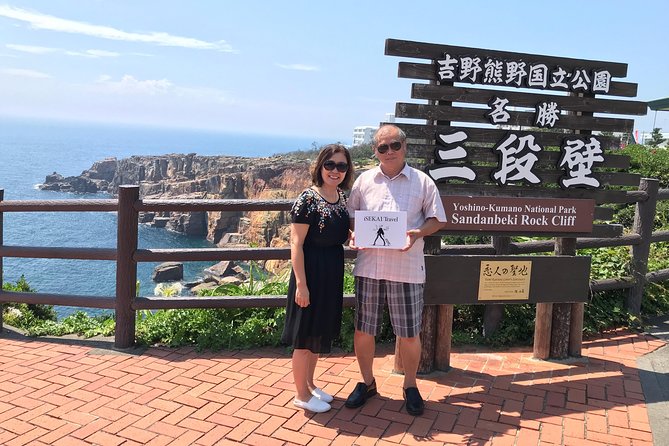Step into the world of Japanese tea and embark on an extraordinary journey of flavors and traditions with the Authentic Japanese Tea Tasting Session: Sencha, Matcha, Gyokuro.
Hosted by ShiZen Tea, this immersive experience offers an unparalleled opportunity to explore the exquisite tastes of sencha, matcha, and gyokuro. From the moment you take your first sip, you’ll be transported to a realm of rich flavors and cultural significance.
Explore the nuances of different grades of sencha, compare the various types of matcha, and savor the luxurious taste of hand-picked gyokuro. This personalized and informative tea tasting session, held in Tokyo, promises to deepen your understanding and appreciation of Japanese tea.
Please note that this experience is not recommended for pregnant travelers and those who are sensitive to caffeine.
Get ready to embark on a tea-tasting adventure like no other!
Great News! You can reserve your spot for free with Viator. You can easliy cancel any time up to 1 day before without paying anything.
Quick Takeaways
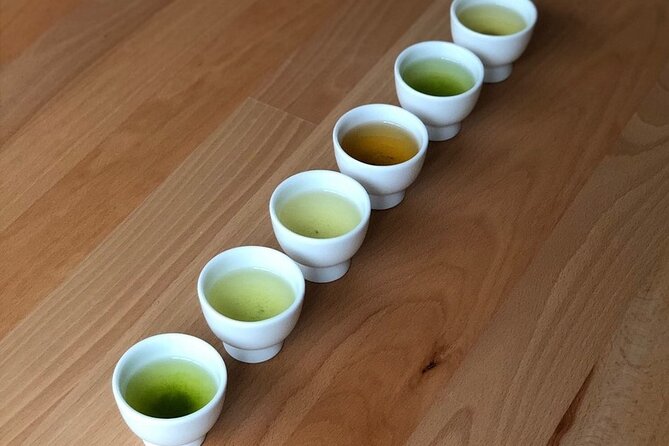
- The tea tasting session includes sencha, matcha, and gyokuro.
- Participants have the opportunity to taste different grades of sencha and compare different types of matcha.
- The tasting session aims to deepen the understanding of Japanese tea, ranging from everyday sencha to high-end sencha.
- The session also includes the enjoyment of high-grade spring matcha and the introduction of hand-picked gyokuro, known for its luxurious and rich flavor.
Not for you? Here's a few more great tours and experiences nearby.
Overview of Japanese Tea Tasting Session
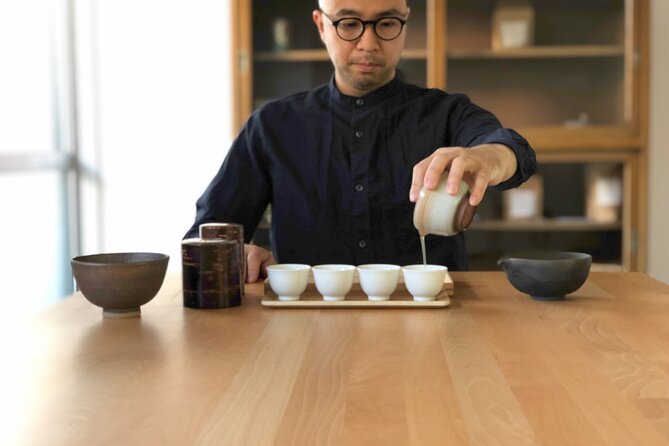
The Japanese Tea Tasting Session offers a rundown of different types of Japanese tea, including sencha, matcha, and gyokuro, allowing participants to explore and compare various grades and flavors.
During the session, you will have the opportunity to learn about the traditional tea brewing techniques and understand the health benefits associated with Japanese tea.
The session begins with an introduction to sencha, where participants can taste different grades of this popular tea and compare their flavors.
Next, the focus shifts to matcha, with participants getting the chance to try different types of matcha and experience their unique tastes.
The session concludes with an introduction to gyokuro, a hand-picked high-end tea known for its luxurious and rich flavor.
You can also read our reviews of more tours and experiences in Tokyo.
Menu of Tea Varieties
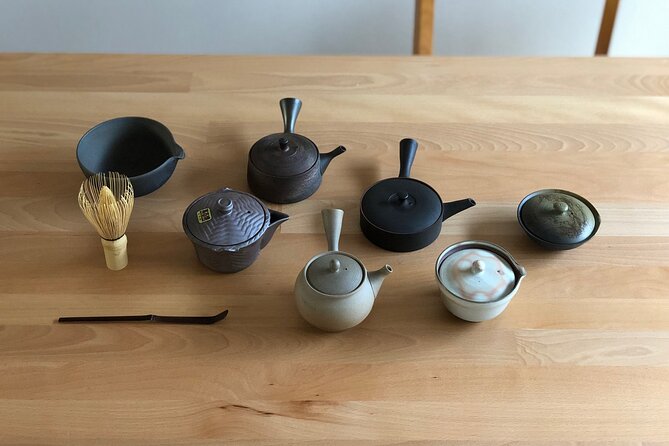
During the Japanese Tea Tasting Session, you will have the opportunity to explore a menu of tea varieties, including sencha, matcha, and gyokuro. This tasting session is designed to deepen their understanding of Japanese tea and its flavors.
The menu includes different grades of sencha, allowing participants to compare and appreciate the nuances of each. They’ll also have the chance to taste different types of matcha, from everyday to high-grade spring matcha, and learn about the differences in taste. Plus, you will be introduced to hand-picked gyokuro, known for its luxurious and rich flavor.
Throughout the session, they’ll learn tea tasting techniques to fully appreciate the unique characteristics of each tea. This menu of tea varieties promises an engaging and informative experience for tea enthusiasts.
Comparison of Sencha Grades
While comparing the different grades of sencha during the authentic Japanese tea tasting session, you will have the opportunity to appreciate the unique characteristics of each tea.
Sencha, a popular type of Japanese green tea, is graded based on various factors such as leaf quality, color, aroma, and taste. The sencha grading system consists of different levels, ranging from everyday sencha to high-end sencha. Each grade has its own distinct flavor profile, offering a diverse range of tastes and aromas.
The lower grades of sencha tend to have a more astringent and grassy flavor, while the higher grades are known for their sweeter and more delicate taste.
Exploring Different Types of Matcha
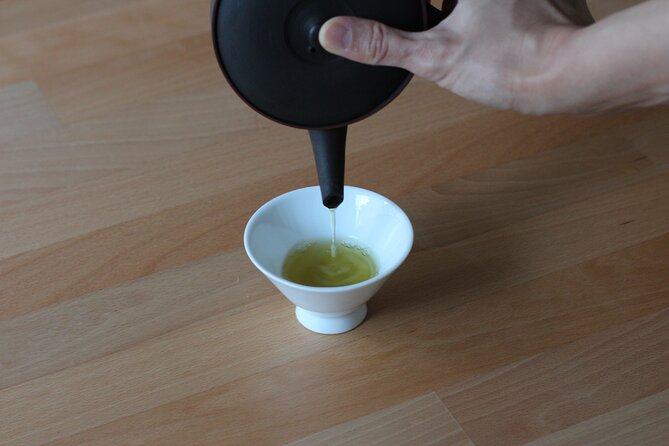
Participants in the authentic Japanese tea tasting session will have the opportunity to explore various types of matcha, experiencing the unique flavors and characteristics of each. Matcha, a finely ground powdered green tea, has a rich history and is renowned for its vibrant green color and health benefits.
Here are three key aspects to consider when exploring different types of matcha:
- Matcha Origins: Participants will discover matcha from different regions in Japan, such as Uji, Nishio, and Shizuoka. Each region has its own distinct flavor profile, influenced by factors like climate, soil, and cultivation techniques.
- Different Brewing Techniques: The tea ceremony master will demonstrate various brewing techniques, including traditional preparation with a bamboo whisk and modern methods using electric frothers. These techniques can greatly impact the taste and texture of the matcha, allowing participants to appreciate the nuances of each preparation method.
- Flavor Profiles: From ceremonial grade to culinary grade matcha, you will taste a range of matcha varieties, each with its own unique flavor profile. They’ll discover the differences in sweetness, umami, and astringency, gaining a deeper understanding of the complexities of matcha.
Introduction to Hand-picked Gyokuro
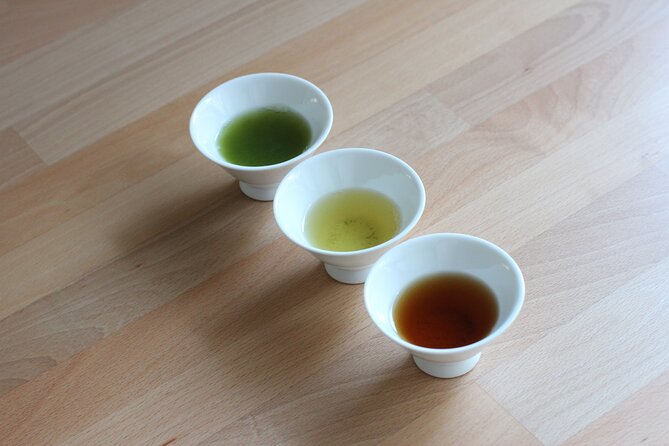
One of the high-end teas in Japan, hand-picked gyokuro offers a luxurious and rich flavor. This premium tea is known for its unique cultivation process and distinct characteristics.
Hand-picked gyokuro is carefully grown in the shade for several weeks before harvesting, which enhances the tea leaves’ sweetness and umami flavor. The shading process also increases the chlorophyll content, giving the leaves a vibrant green color.
Because of its delicate and complex taste, gyokuro is often reserved for special occasions and traditional Japanese tea ceremonies.
The benefits of hand-picked gyokuro extend beyond its flavor. This tea is rich in antioxidants and has been associated with numerous health benefits, including improved focus, relaxation, and a boosted immune system.
- Things To Do In Tokyo In November
- Things To Do In Tokyo In March 2024: Tokyo’s Best March Events
- Things To Do In April In Tokyo 2024: Tokyo’s Best April Events
- Things To Do In Tokyo In December 2023: Tokyo’s Best December Events
- Tokyo’s Weather And Seasons: A Guide For The Perfect Visit
- Tokyo Midtown Cherry Blossom Season
Sencha Tasting Comparison
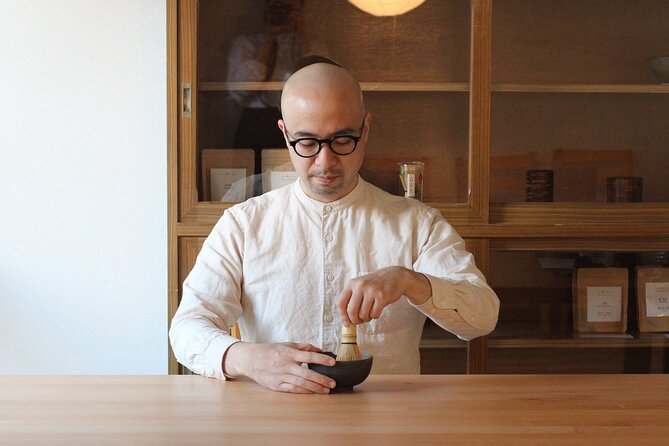
The sencha tasting comparison allows participants to explore the nuances and variations of this popular Japanese tea. Comparing sencha flavors and identifying the best sencha grade can be an exciting and educational experience.
Here are three key points to consider during the sencha tasting comparison:
- Flavor Profiles: Participants will have the opportunity to taste different grades of sencha, ranging from everyday options to high-end varieties. Each grade offers a unique flavor profile, with notes of grass, umami, and sweetness. By comparing the flavors, participants can develop a deeper understanding of the intricacies of sencha.
- Aroma and Appearance: Along With taste, the aroma and appearance of sencha can provide valuable insights into its quality. The sencha tasting comparison allows participants to observe the vibrant green color and fresh aroma of each tea, helping them to identify the best sencha grade.
- Aftertaste and Mouthfeel: Another aspect to consider during the sencha tasting comparison is the aftertaste and mouthfeel of each tea. Some sencha varieties may leave a lingering sweetness on the palate, while others may have a more refreshing and crisp finish. By paying attention to these characteristics, participants can further refine their preferences and appreciation for sencha.
Deepening Understanding of Japanese Tea
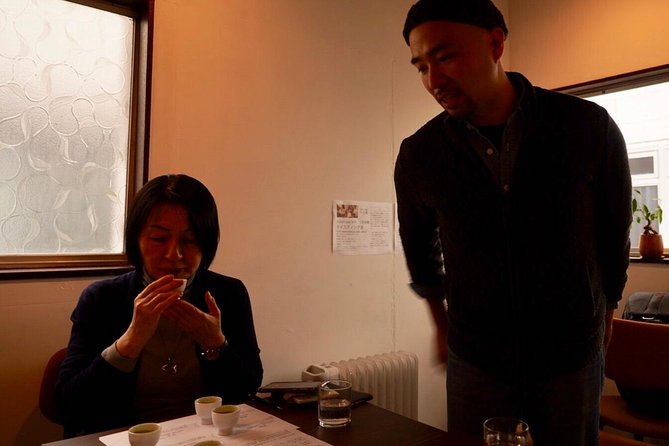
To deepen their understanding of Japanese tea, participants can explore the rich history and cultural significance of this beloved beverage. Japanese tea culture dates back centuries and holds a special place in the hearts of the Japanese people. It isn’t just a drink, but a symbol of harmony, respect, and mindfulness. Japanese tea ceremonies, known as chanoyu, are steeped in tradition and are a reflection of the country’s Zen philosophy.
Along With its cultural importance, Japanese tea also offers numerous health benefits. It’s rich in antioxidants, which help protect the body against damage from free radicals. Japanese tea is also believed to boost the immune system, aid in digestion, and promote relaxation. Matcha, a type of powdered green tea, is particularly revered for its high concentration of antioxidants and calming effects.
Enjoying High-Grade Matcha and Gyokuro
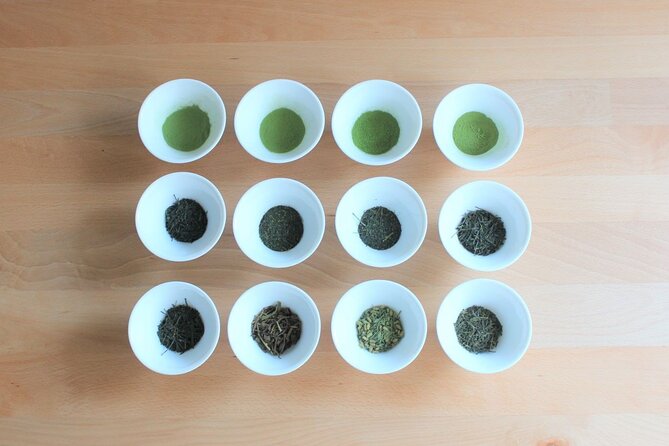
How can participants fully enjoy the high-grade matcha and gyokuro during the authentic Japanese tea tasting session? To fully appreciate and savor the experience, here are some tips for enjoying these exquisite teas:
- Benefits of drinking matcha and gyokuro for health: Both matcha and gyokuro are known for their health benefits. Matcha is rich in antioxidants and can boost metabolism, improve focus, and promote relaxation. Gyokuro, on the other hand, contains high levels of amino acids and can enhance mental clarity and concentration.
- How to properly prepare and serve high-grade matcha: To prepare high-grade matcha, start by sifting the powder to remove any clumps. Then, whisk it with hot water in a chawan (tea bowl) until frothy. Serve the matcha in small, shallow cups called chawan to appreciate its vibrant color and aroma.
- How to properly prepare and serve high-grade gyokuro: Gyokuro requires a lower water temperature and longer steeping time compared to other teas. Use water around 140°F (60°C) and steep the leaves for about 2-3 minutes. Serve the gyokuro in small, lidded cups to preserve its aroma and flavor.
Frequently Asked Questions
Is Transportation Provided to the Meeting Point for the Tea Tasting Session?
Yes, transportation is provided to the meeting point for the tea tasting session. Participants will be picked up at Morishita Otorhinolaryngology in Tokyo and brought back there at the end of the session.
Are There Any Age Restrictions for Participating in the Tea Tasting Session?
Age restrictions apply for the tea tasting session. Participants must be of legal drinking age, as the cultural significance of Japanese tea is often enjoyed by adults.
Can I Purchase the Different Types of Tea That Are Being Tasted During the Session?
Yes, participants can purchase the different types of tea that are being tasted during the session. The tea quality is exceptional, ranging from everyday sencha to high-end gyokuro, allowing individuals to enjoy their favorite flavors at home.
Are There Any Specific Health Benefits Associated With the Different Types of Japanese Tea?
The different types of Japanese tea, such as sencha, matcha, and gyokuro, are known for their health benefits and cultural significance. Each tea has its own unique properties that contribute to overall well-being and are deeply rooted in Japanese traditions.
Will There Be Any Snacks or Refreshments Provided During the Tea Tasting Session?
Yes, snacks and refreshments will be provided during the tea tasting session. In addition, you will have the opportunity to purchase the different types of tea available and learn about their health benefits.
The Sum Up
To sum it up, ShiZen Tea’s authentic Japanese tea tasting session offers a unique and immersive experience for tea enthusiasts. Participants have the opportunity to explore the rich flavors and traditions of sencha, matcha, and gyokuro, while deepening their understanding and appreciation of Japanese tea.
With a focus on personalized and informative sessions, this tasting experience provides a menu of tea varieties, comparisons of sencha grades, and an introduction to hand-picked gyokuro. Whether you’re a beginner or a seasoned tea connoisseur, this tea tasting session is sure to delight your taste buds and expand your knowledge of Japanese tea.
More Food & Drink Experiences in Tokyo
- Okonomiyaki Cooking,Japanese Sake Free Flowing Experience
- Private Wine Tasting Tour in Yamanashi Prefecture
- Shibuya Best Vegetarian Vegan Friendly Food Tour
- Special Breakfast Onigiri Tasting Activity for The Early Birds
- Premium Sake Tasting & Pairing Experience in a Historical Brewery
- Tokyo Street Food Tour – 7 Japanese Foods
More Tour Reviews in Tokyo
- Tokyo Airport Transfers: Tokyo City to Tokyo-Narita Airport NRT in Business Car
- Private & Custom TOKYO Day Tour Toyota COMMUTER (Max 13 Pax)
- Private Transfer From Tokyo Port to Tokyo Haneda Int Airport(Hnd)
- Shinjuku Golden-Gai and Kabuki-Cho Bar Hopping With Master Guide
- SHIMOKITAZAWA Local Walking Tour
- Small Group Iaido Class in Tokyo
Not for you? Here's more nearby things to do in Tokyo we have reviewed
- Tokyo Airport Transfers: Tokyo City to Tokyo-Narita Airport NRT in Business Car
- Private & Custom TOKYO Day Tour Toyota COMMUTER (Max 13 Pax)
- Private Transfer From Tokyo Port to Tokyo Haneda Int Airport(Hnd)
- Shinjuku Golden-Gai and Kabuki-Cho Bar Hopping With Master Guide
- Small Group Iaido Class in Tokyo
- Private Casual Photoshoot Tour in Tokyo
- Private Transfer From Tokyo City Hotels to Sendai Cruise Port
- Private Transfer From Tokyo Narita Int Airport(Nrt) to Tokyo Port
- Okonomiyaki Cooking,Japanese Sake Free Flowing Experience
- Mt. Fuji Majestic Tours : Shinjuku to Arakurayama and Beyond
- Private Transfer From Tokyo Cruise Port to Tokyo Hotels
- Private Transfer From Nagasaki Hotels to Nagasaki Cruise Port

